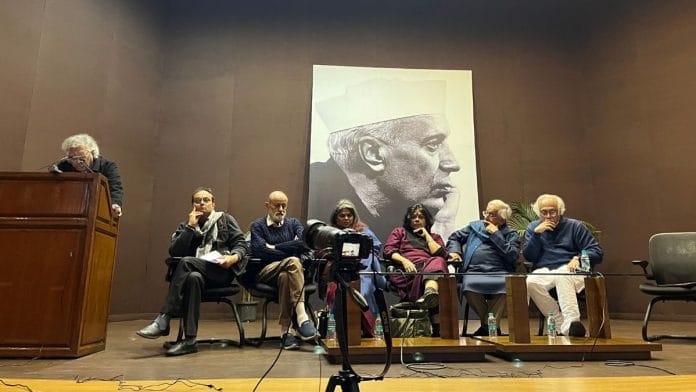New Delhi: India’s first prime minister, Jawaharlal Nehru, has been deified and deconstructed to no end. A discussion at Delhi’s Jawahar Bhawan promised to do the same––this time, it was Nehru’s scientific temper and commitment to rationality that was up for grabs.
And it was seized by a panel heavy on intellectual heft and cultural capital, which included scientist Gauhar Raza, senior Congress leader Jairam Ramesh, historian Aditya Mukherjee, professors Abha Dev Habib and R Mahalakshmi, and poet Ashok Vajpeyi.
“Everyone here must’ve attended several such conferences. What’s there to say?” said Raza. “But even today, it’s difficult to understand scientific temper without reading Nehru.”
For Nehru, according to Raza, scientific temper and rationality were inextricably linked to freedom––one couldn’t exist without the other. Nehru’s The Discovery of India is unequivocal evidence of what was one of his governing principles.
However, this discussion wasn’t just a bounty of praise for Nehru. The speakers repeatedly returned to the present, where rationality and scientific temper appear to be in short supply––given the growing powers and significance of various babas, and the slew of politicians who draw gains from them.
“This is a constant refrain today. Cows inhale and exhale oxygen. You might smile. But as a scientist, I’m anxious,” said Raza.
The historians present also spoke of various instances from the Upanishads and the Vedas, which provide evidence not necessarily of scientific temper, but of a rational approach to living life and an appetite for discovery.
“There are hymns in the Rig Veda that demonstrate curiosity. A curiosity of creation, of life and death. Where the water comes from, what happens when we die,” said Mahalakshmi, a professor at JNU’s Centre for Historical Studies. “These are the beginnings of rationality.”
Also read: Nehru model slowed India’s economic growth. Licence Raj made it worse, says Amitabh Kant
‘Attack on scientific temper’
The difference between Nehru and Modi’s Indias, the ostensible withering away of scientific temper, has a concrete manifestation––the country’s public educational institutions.
Abha Dev Habib, professor of physics at Delhi University’s Miranda House, referred to the recent launch of a book, Modi vs Khan Market Gang, held on the university campus. According to Habib, the author, journalist Ashok Shrivastav who works at Doordarshan, compared DU Vice Chancellor Yogesh Singh to Hanuman.
“These are the kinds of spaces our educational institutions are becoming. It’s a clear attack on scientific temper and rationality,” she said.
For Habib, it was serious, while other speakers, such as Vajpeyi, wove in humour to make sense of new India. And ensured that Nehru remained less man, and more myth.
Vajpeyi said he was fortunate enough to have met Nehru a handful of times through the course of his life. The poet was studying at St. Stephen’s College when he snuck into a lecture celebrating the life of Russian author Leo Tolstoy, at which Nehru was the chief guest. Nehru was one of multiple luminaries. The panel also consisted of poets John Wain and Stephen Spender.
Nehru had just returned from Aurangabad, Maharashtra, and the audience presumed he’d say a couple of banal things about the city. Instead, they were pleasantly surprised––Nehru dived into Tolstoy.
“There’s greatness that ennobles you, which makes you participate in itself. Tolstoy’s greatness belongs here,” Nehru had said, as recited by Vajpeyi from memory. “The crowd went into furious applause,” the poet added.
Then, as opposed to Tolstoy, Spender gave his two cents on Nehru. “As editor I meet presidents and prime ministers from all over the world. And there’s no statesman in the world that can possibly say something like what Nehru has said today,” Spender supposedly said.
“Remember. Vishwaguru,” added Vajpeyi in mock seriousness.
Congress leader Jairam Ramesh also got a jibe in, but after paying his respects.
“In the last 100 years, if there’s anyone in public life, who has spoken not about science, but about scientific temper, it is Nehru,” he said. Meanwhile, he added, while Nehru had a degree in science, our current prime minister has a degree in all of political science. The audience, as expected, burst into laughter.
Nehru attended the Indian Science Congress each year, set up the IITs alongside the cultural academies, and managed to locate scientific temper in Indian culture. And the country, according to the panel at least, is morphing into something else entirely––distancing themselves from his fundamental tenets.
“If this is the Hindu rashtra, God bless the Hindus. And the rashtra,” said Vajpeyi drily.
(Edited by Aamaan Alam Khan)







This again appears to be in the league of Vir sanghvi ‘s propagandist line of argument. You and the erudite panel that you quote is only taking potshots on the PM ignoring the fact that the country is progressing on all fronts including Science. The establishment may have decried Nehru per se but never the scientific temperament. Please desist from propaganda from your platform.
We have Kamakoti, IIT Madras director saying that a sanyasi got cured of his high fever by drinking cow urine.